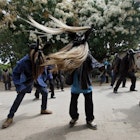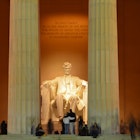
May 12, 2022 тЂ 5 min read

While the sheer size of Los Angeles seems unruly, the diversity of its neighborhoods offers a little something different every where you go ТЉ Andrew Kennelly
So you're planning a visit to the City of Angels, and you're a bit daunted. We hear you. At about 4,000 square miles, LA County is larger than some US states, and with over 10 million inhabitants in the greater metro area, it's far and away America's most populous county. There are more people here than in many European countries and they are all packed into a space one-quarter the size of the Netherlands.

So our advice to you: just as you wouldn't try to take in a European country all at once, don't try it with LA either. Divide 'The Big Orange' into slices, and you'll find it a lot more digestible.
No LA neighborhood has seen more dynamic change over the last decade than 'DTLA.' Until the mid-Aughts, it was a virtual ghost town after the office workers went home from its skyscrapers. Those days are gone. Now it's hipster central with an ever-evolving cultural and nightlife scene, including some of America's top museums, spectator sports and ethnic neighborhoods filled with eats and shopping.
For high culture, try the Broad Museum or the Museum of Contemporary Art, which straddle Grand Avenue near the Music Center and Walt Disney Concert Hall. Pop culture gets curated at the Grammy Museum, while the Arts District by Little Tokyo practically bursts with galleries like the monumental Hauser & Wirth. You'll also find boutiques that feel like galleries and an energetic population to keep them busy.

On the dining scene, it seems there's a new opening every week or two, but fun and historic showplaces include the Grand Central Market and Clifton's Republic (though truth be told, we like the latter's over-the-top dУЉcor better than the food). The lanes of Olvera Street, LA's original settlement from the 1780s, are packed with taquerias and kitschy gift shops, and a few blocks away Chinatown mixes dim sum restaurants with Asian bowl cuisine at Chego and killer spicy fried chicken at Howlin' Ray's.
After dark, survey the scene from a rooftop bar like Spire 73 or the bar at the Standard Hotel.
Downtown is also the hub of LA's transit network, with subway and light rail lines for easy access in almost any direction.

Pasadena is for more classical tastes. The look of this city is pure Americana: stately homes and a low-to-the-ground downtown of brick-faced storefronts.
The star attraction is the Huntington Library and Gardens, with 120 flowing acres of themed gardens (Chinese, Japanese, desert, rose, etc) and museum installations of art, literature and decorative arts.
A few miles away, the refined wood and stained glass work of California craftsman architecture is on full display at the Gamble House. Called one of the 10 most significant residences in the US, this 1908 home was built by Charles and Henry Greene for the heir to the Procter & Gamble fortune.
You're a short walk away from the Norton Simon Museum, one of America's best for Renaissance, impressionist and 20th century art, plus Buddhist and Hindu sculpture and a garden inspired by Monet's Giverny. Alternatively, Kidspace Children's Museum is 3.5 acres of SoCal sunshine-kissed indoor and outdoor science and nature exhibits, plus creative activities for the littlest visitors.

First things first: there are two Hollywoods, really т Hollywood the neighborhood and Hollywood the industry т and they don't overlap much geographically. But even if your chances of celebrity-spotting or stumbling on a movie set are scarce here, 'Hollywood' as shorthand for showbiz, pervades the neighborhood.
Hollywood Blvd is the main thoroughfare, and it's been on a steady if slow climb from bedraggled to bedazzled. Historic movie palaces like the Chinese, Egyptian and El Capitan line the Walk of Fame at the intersection of Hollywood Blvd and Highland Ave (site of the Metro Red Line subway station). In the Chinese Theater's forecourt, compare hand and shoe-sizes with generations of screen legends' forever imprinted in concrete. Southeast on Sunset Blvd, the Arclight Hollywood cinema has a more modern feel and a higher star quotient.
If your grandma had an attic full of movie memorabilia, it would probably feel a lot like the Hollywood Museum. Imagine four stories crammed with props, costumes, photos, posters and more. The building used to be the studio where Hollywood makeup impresario Max Factor turned women into leading ladies.
About a half-mile away, the Hollywood Bowl is one of the world's largest natural amphitheaters. At nearly 18,000 seats, it's the summer home of the Los Angeles Philharmonic, and just about any performing great you've ever heard of has played here. Movie buffs also flock to summer weekend screenings at Hollywood Forever Cemetery. Guest DJs spin while attendees picnic on the lawn before enjoying a film on the wall of a giant mausoleum. It's not nearly as macabre as it sounds.

Then there's West Hollywood. 'WeHo,' as it's known to its many friends and admirers, is its own city in both geography and attitude. Along Sunset Blvd, the iconic Sunset Strip has been nightlife central for nearly a century thanks to venues like the Whisky A-Go-Go, Comedy Store and Chateau Marmont Hotel.
Downhill, Santa Monica Blvd is the thumping, muscular heart of SoCal's LGBT community in dozens of restaurants, bars, clubs, gyms and shops. Just beyond, the three soaring pavilions of the Pacific Design Center are only the largest of WeHo's interior design venues. And be sure to check out the trendy fashion shops of Melrose Ave and Robertson Blvd.

Santa Monica & Venice
LA's easiest access to oceanfront, at the end of the Metro Expo light rail line, these neighboring districts have fun and flair to spare. The city of Santa Monica condenses many of the best parts of the vast metropolis into 8ТН square miles: wide, sandy beach complete with surfing schools, paved cycling path and a pier topped with an amusement park; three distinct shopping districts т Third Street Promenade, Main St and Montana Ave; and some of California's top hotels and restaurants.
South of Santa Monica, Venice has morphed from hippie central to tech magnet in the space of a generation. Even if the quality of offerings has changed a bit on any given block you'll find both cultures coexisting т more or less peacefully.
If Santa Monica's beachfront is classic, the Venice Boardwalk is a funky collection of street artists and performers, skateboarders, basketball players and iron-pumpers in public courts and gyms; all in all a general beachside carnival, especially on weekends. Head just inland for more sophisticated pursuits: boutique shopping along Abbot Kinney Blvd and strolling the Venice Canals. These water ways were dug over a century ago and are connected by graceful bridges and lined with all kinds of homes from bungalows to mansions.
Whichever coastal neighborhood you choose, be sure to head to the beach at the end of the day. A sunset over the Pacific is one event loved by every local and visitor.

History
How these American artists are finding inspiration during the coronavirus pandemicMay 18, 2020 тЂ 7 min read

May 12, 2022 тЂ 5 min read


Nov 27, 2024 тЂ 7 min read



